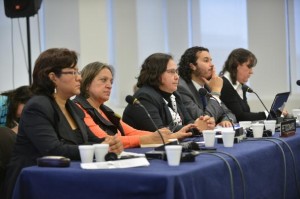
Most of us have heard about the murders of young women in Ciudad Juarez or the genocidal rapes in the Congo. In the notorious cases, at least the victims’ plight is recognized–although we often despair at the lack of real change that years of news stories and government and NGO programs has wrought. Public and official forums note the seriousness of the crimes, and attempts are made to address them.
Maybe if the world had stepped up sooner to confront those crises, fewer women would have been killed. Too often as societies we fail to respond to the warnings of growing violence against women until the heart-wrenching testimonies of those who suffered, in part due to our inattention, shake us into action. The silent crises leave women, victims and potential victims, without a voice to cry out.
Now women’s organizations are raising a red flag on Nicaragua. In a hearing on March 12, the commissioner for Nicaragua of the Inter-American Commission on Human Rights (IACHR), Rose-Marie Antoine, concluded that the Central American country has “an unacceptably high rate of sexual violence.”
She further noted that, “there certainly seems to be a need for more proactive measures by the state.”
The lack of such measures and the complicity of the government in some cases of violence is precisely what representatives of Nicaraguan women’s organizations reported to the session on violence against girls and women. Azahalea Solis, lawyer and representative of Nicaragua’s Autonomous Movement of Women (MAM, by its Spanish initials), stated that there is a general “climate of protection” for perpetrators of violence against women in her country, and stated that of 85 femicides during 2012, only 27 resulted in arrests and four in a prison sentences. Thirteen of these women had reported attacks to government offices and were not granted the protective measures that could have saved their lives.
Solis noted two alarming tendencies: the increase in the incidence of violence against women, and the high rate of violence committed against girls. She said some 84% of reported crimes of sexual violence were committed against girls and young women under 17.
“In the last five years, the situation hasn’t just remained the same; it has steadily increased without a firm response on the part of the Nicaraguan government,” Solis said. She said that despite advances in the legal framework, especially with the new Integral Law on Violence Against Women, “the impact that the advances in the law could have had to encourage reporting crimes and reducing impunity has been cancelled out by the behavior of the police and the sentences coming out of the justice system.” She described the “re-victimization” of women by the police when they go to report a crime and are harassed or belittled by authorities.
An especially “threatening phenomenon” according to Solis, is the way sexual violence is merging with political violence. She cited a case from November of 2012 where a group of young women protesting against the government party for fraud in local elections, were taken into custody and tortured beaten and threatened with rape—without a report of an investigation to date. She cited a several cases of officials abusing their authority and protecting criminals.
“We’re accused of politicizing the issue, but the truth is the lack of justice increases the violence and there’s a serious problem of corruption and impunity in the country.”
Martha Maria Blandon told the commissioners that since the government outlawed any form of therapeutic abortion, girls who have been victims of rape have been forced to carry high-risk pregnancies. Although the penal code considers sex with a child under 14 nonconsensual, of 1,453 births of mothers between 10-14 years old, none has been investigated or prosecuted to the knowledge of human rights defenders.
Violet Delgado, an expert in women’s rights and a MAM member, identified a huge gap between the advances in institutions and governmental commitments to deal with sex trafficking, and the lack of reports, investigations and sentencing. She told Americas Updater that “There’s very little access to information, and abuse and partiality in the cases is the rule rather than the exception,” she told the hearing.
Delgado said that there are many accounts and articles in the press about trafficking in the country. Most women are being trafficked for prostitution and others forcibly recruited to carry drugs. In human trafficking, corruption in government facilitates criminal activity.
In the absence of effective action by the government, it’s the women’s organizations that have built up services for women victims of violence. Delgado affirms, “Organizations of civil society are the only ones that provide attention and find the resources to crate services, human resources like psychologists and lawyers to accompany women on their way to get Access to justice, to just listen to them.” She noted that there are more than 50 organizations that provide support and of the 11 women’s shelters, only one is governmental.
The women at the IACHR hearing called for a visit from the commissioners on Women, Children and Nicaragua. Solis said that the most important contribution of the international community and women in other countries now is to bring the problem to light. “The behavior of the Nicaraguan government should be a point on the agenda [of human rights organizations], to evaluate the government’s role in human rights violations and crimes against women.”
Laura Carlsen is a writer and director of the CIP Americas Program www.americas.org, based in Mexico City.



